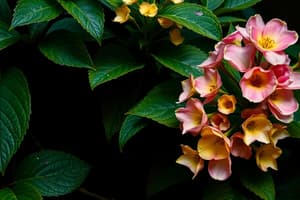Podcast
Questions and Answers
What is the scientific study of plants called?
What is the scientific study of plants called?
- Botany (correct)
- Zoology
- Horticulture
- Ecology
All organisms that produce spores are classified as plants.
All organisms that produce spores are classified as plants.
False (B)
Name two types of plants that do not have flowers.
Name two types of plants that do not have flowers.
Conifers and ferns
The plant kingdom no longer includes ______ due to their differences in biochemical and genetic characteristics.
The plant kingdom no longer includes ______ due to their differences in biochemical and genetic characteristics.
Match the following plant types with their characteristics:
Match the following plant types with their characteristics:
Which of the following statements about plants is accurate?
Which of the following statements about plants is accurate?
Biologists universally agree on the classification of algae as plants.
Biologists universally agree on the classification of algae as plants.
What is a major reason that defines the difficulty in categorizing plants?
What is a major reason that defines the difficulty in categorizing plants?
Which features are described as relictual features in algae and ferns?
Which features are described as relictual features in algae and ferns?
Modern flowering plants originated around 250 million years ago.
Modern flowering plants originated around 250 million years ago.
What term is used for features that have evolved from ancestral characteristics?
What term is used for features that have evolved from ancestral characteristics?
The group of chemical compounds in asters that discourage herbivores from eating the plants are a highly derived feature known as ______.
The group of chemical compounds in asters that discourage herbivores from eating the plants are a highly derived feature known as ______.
Which of the following is a characteristic of modern conifers?
Which of the following is a characteristic of modern conifers?
Algae have undergone significant evolutionary changes compared to their ancestors.
Algae have undergone significant evolutionary changes compared to their ancestors.
Name one of the three significant features that evolved with flowering plants.
Name one of the three significant features that evolved with flowering plants.
Match the plant group with the corresponding time period they originated.
Match the plant group with the corresponding time period they originated.
What is the origin of the word 'botany'?
What is the origin of the word 'botany'?
The study of plants, botany, has its origins solely in religious beliefs.
The study of plants, botany, has its origins solely in religious beliefs.
Name one major influence on methods for analyzing the universe until the 15th century.
Name one major influence on methods for analyzing the universe until the 15th century.
In ancient Greek philosophy, Democritus postulated the existence of __________.
In ancient Greek philosophy, Democritus postulated the existence of __________.
Match the following historical concepts with their descriptions:
Match the following historical concepts with their descriptions:
What is a fundamental principle of all religions mentioned?
What is a fundamental principle of all religions mentioned?
Early agricultural studies relied heavily on consistent results from experimentation.
Early agricultural studies relied heavily on consistent results from experimentation.
What challenge did religious methods face in studying agricultural yields?
What challenge did religious methods face in studying agricultural yields?
Study Notes
Introduction to Botany
- Botany refers to the scientific study of plants, requiring an understanding of both "plants" and "scientific study."
- Difficulties arise in defining plants due to their vast diversity and exceptions, including debates on whether algae qualify as plants.
- Common characteristics of plants include green leaves, stems, roots, and flowers; however, exceptions like conifers (pines, spruces) and succulents exist.
Concept of Plants
- Ferns and mosses are readily recognized as plants due to their distinct features.
- Historically, fungi were classified as plants; however, they are now understood to differ significantly in biochemical and genetic aspects.
- Algae are well-adapted to aquatic environments and exhibit many unchanged features dating back over 1 billion years, highlighting their evolutionary stability.
Evolution of Plants
- The earliest plants, similar to modern ferns, have remained largely unchanged for approximately 250 million years.
- Conifers first appeared around 320 million years ago, while flowering plants evolved between 100 to 120 million years ago, developing distinct traits such as flowers and efficient water-conducting wood.
- Asteraceae family plants (like sunflowers and daisies) exhibit advanced traits that discourage herbivores, resulting from evolution from ancestral features.
Scientific Method in Botany
- Prior to the 15th century, knowledge of the universe was often derived from religious beliefs and speculative philosophy, rather than empirical observation.
- Religious explanations prevented consistent scientific understanding, attributing natural phenomena to divine intervention rather than observable causes.
- Ancient Greek philosophers, such as Democritus, attempted to use logical reasoning to explain natural occurrences, laying a foundation for future scientific inquiry.
Sampung Halamang Gamot
- A resource directory for medicinal plants, “Sampung Halamang Gamot,” can be found at the Philippine Institute of Traditional and Alternative Health Care website.
Studying That Suits You
Use AI to generate personalized quizzes and flashcards to suit your learning preferences.
Related Documents
Description
This quiz explores the foundational concepts of botany, including the definition and significance of plants, the scientific method, and the evolution of plant life. It also covers traditional medicinal plants, providing a comprehensive understanding for beginners in the study of botany.



